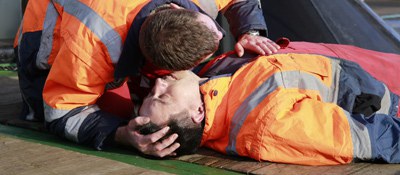Seeärztlicher Dienst
Brandstwiete 1
20457 Hamburg

Annelie Ewen
Phone: +49 40 361 37-252
Fax: +49 40 361 37-333
Mail: annelie.ewen@bg-verkehr.de
Help rather than look away
Legal questions regarding medical care on board
Masters and ship officers who take care of other members of crew or other people on board medically do not have to worry about legal consequences if they act according to their medical training (initial and follow-up training courses) to the best of their knowledge and belief.
It is of course always best if the attending master or ship officer talks to the injured or sick person and asks for their consent to the medical measures. If a person is unresponsive, legally, a presumed consent (agency without specific authorisation) exists which means there is no ground for legal issues.
Damages based on civil law only in exceptional cases
Only in exceptional cases – gross negligence or intentional behaviour leading to the death or a worsening of the damage – can a treated person claim for damages against the attending master or ship officer on board. But those who do their best throughout the medical care and act appropriately are not liable for damages. Gross negligence occurs when the simplest considerations, that are generally apparent, are disregarded. Principally, ignorance can not be the cause for blame of gross negligence. Intentional behaviour occurs when an injury or damage during the medical care is caused consciously and wilfully or is at least accepted approvingly.

An unintentionally inflicted injury (e.g. fractured rips from a cardiac massage) or material damage (e.g. cut clothing of the injured person) do not lead to a claim for damages.
Personal physical damages linked to the medical care are covered by the responsible accident insurance company and require a formless notification. Material damages can be claimed via the shipping company.
No criminal liability for careful assistance
The principle that you are not liable when you act to the best of your knowledge and belief applies here as well. On the contrary: those who do not help may get convicted of non-assistance of a person in danger in accordance with section 323 c of the German Penal Code. The obligation for masters and officers on board of sea-going vessels to offer assistance is even larger in comparison to a bystander's first-aid because the legislator has assigned the responsibility for medical care on board to the masters and officers (section 109 paragraph 1 of the Maritime Labour Act).
The obligation to promptly provide assistance during an emergency is only inapplicable when assistance is unreasonable. For example, this might be the case if the assistance was connected with a considerable risk for oneself or with the breach of other important duties.
Despite medical care, the state of health might decline or the injured person might even die. If the assistance was conducted with the necessary care, i.e. personal knowledge, competences and according to the circumstances, the assistance is not liable.
Further information on the topic is given in a brochure on legal questions regarding first aid by the DGUV (German statutory accident insurance) . The principles outlined in this brochure generally apply to medical care on board by masters and officers as well.

